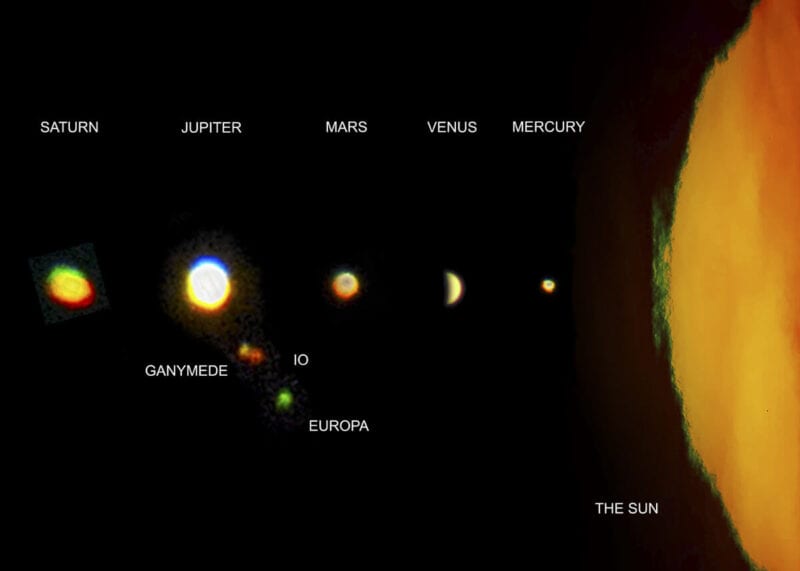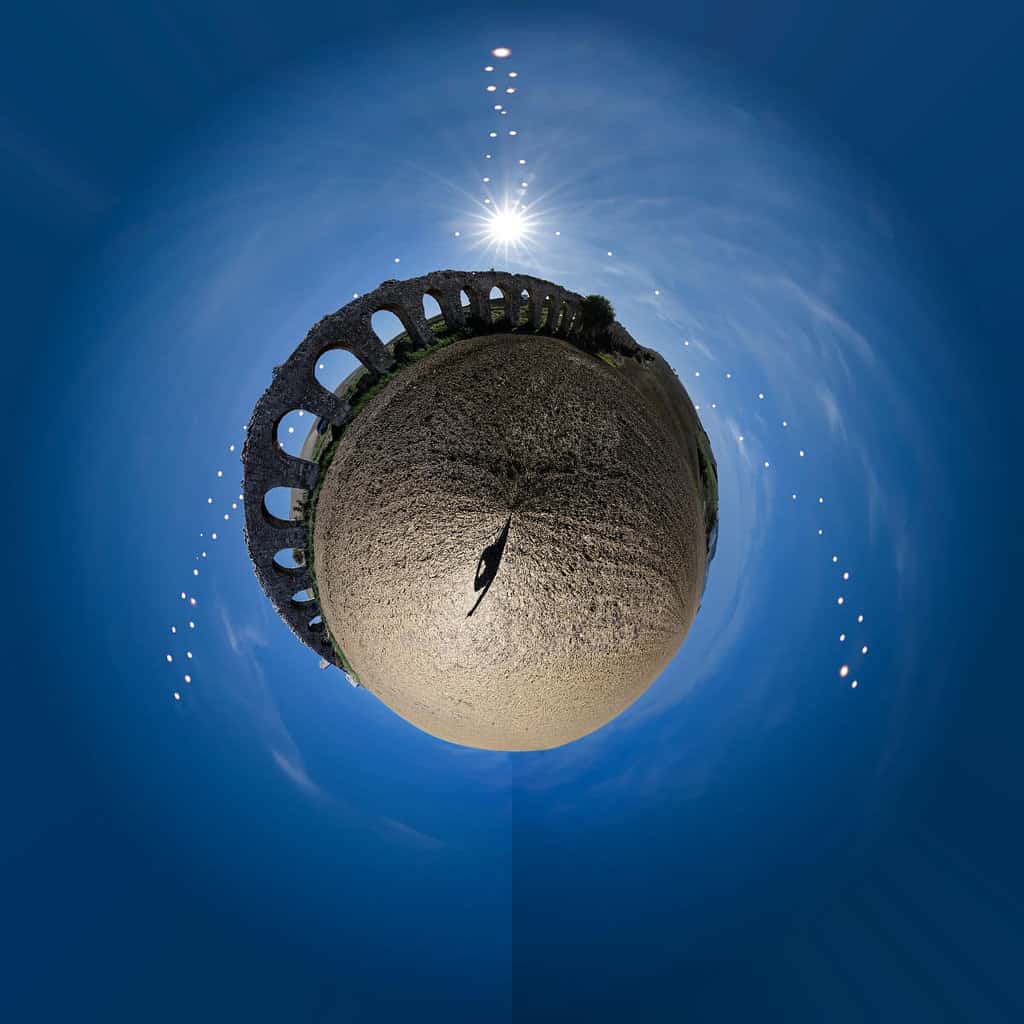In this interview, Marco Meniero outlines how he photographed this stunning image above of an analemma.
What is an Analemma?
The analemma is the orthographic projection of the apparent motion of the Sun on the plane of the local meridian; it is used to determine the height of the stars, in particular, that of the Sun because it is useful for building sundials (also called quadrants or analemmatic clocks).
Often, looking at the sundials, a curve in the shape of an “eight” can be observed which intersects the hour lines. This curve is called the analemma or lemniscate.
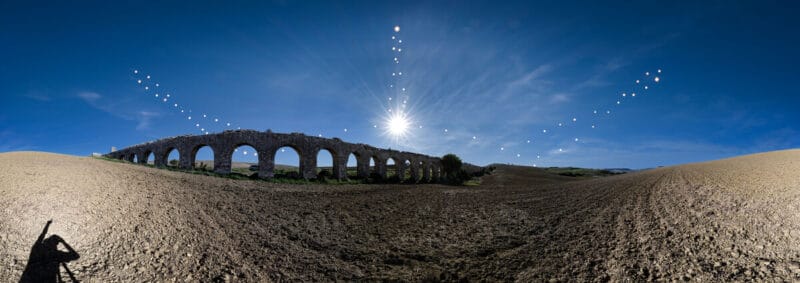
However, with a photographic trick, the analemma can also be seen projected in the sky.
In the history of astronomical photography, Dennis De Cicco was one of the first in the 1990s to come up with the idea of photographing the Sun for a year (when passes to the Meridian) always at the same time and at constant daily intervals.
The result consists in seeing the “eight” curve projected into the sky in a southerly direction. This intuition subsequently spread to such an extent that analemma photos are widespread today.
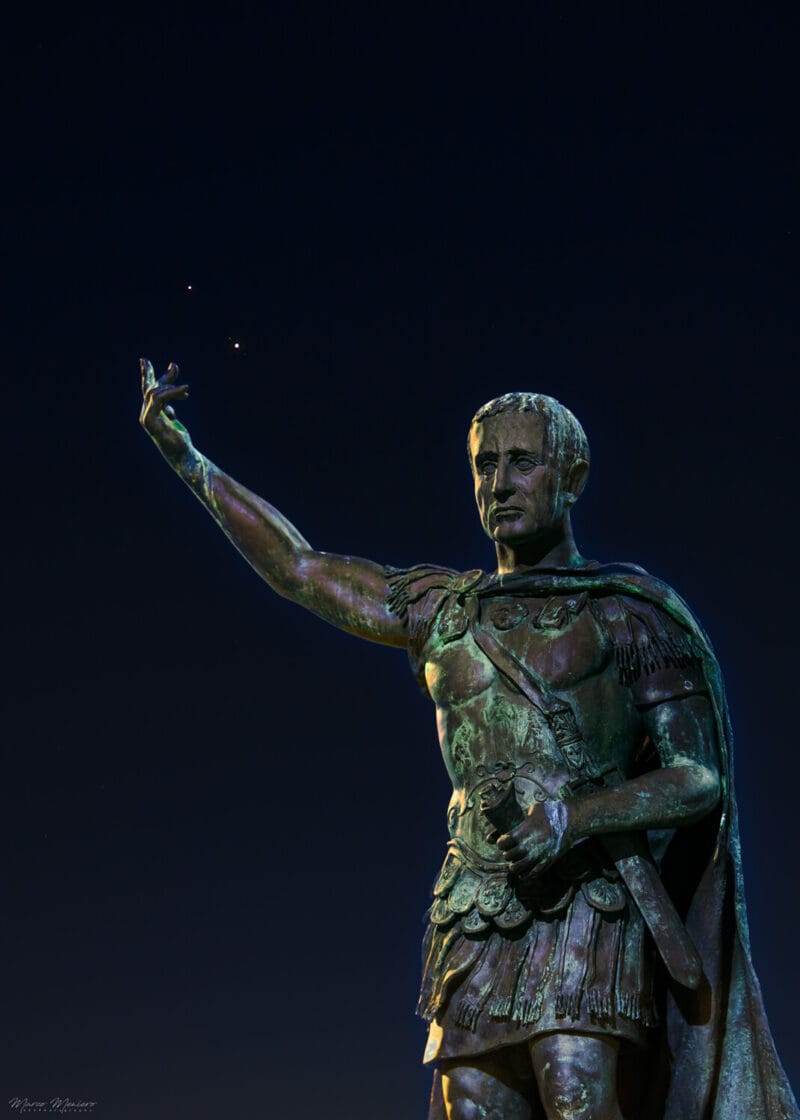
How Did You Capture Your Shot?
Following this idea, I created a photographic composition by joining the analemma curve with two other curves created with the same technique but at different times: the one on the left at 07:20 UTC and te one on the right at 15:00 UTC.
Furthermore, on the day of the winter solstice I resumed the path of the Sun throughout the day.
You can see the curves close to twilight strongly inclined unlike the one at the Meridian which is vertical.
I took the three curves from the Viterbo Airport, but from my position I was unable to resume the panorama because I could see military installations and therefore I decided to move 30km considering that this difference does not visibly change the analemma.
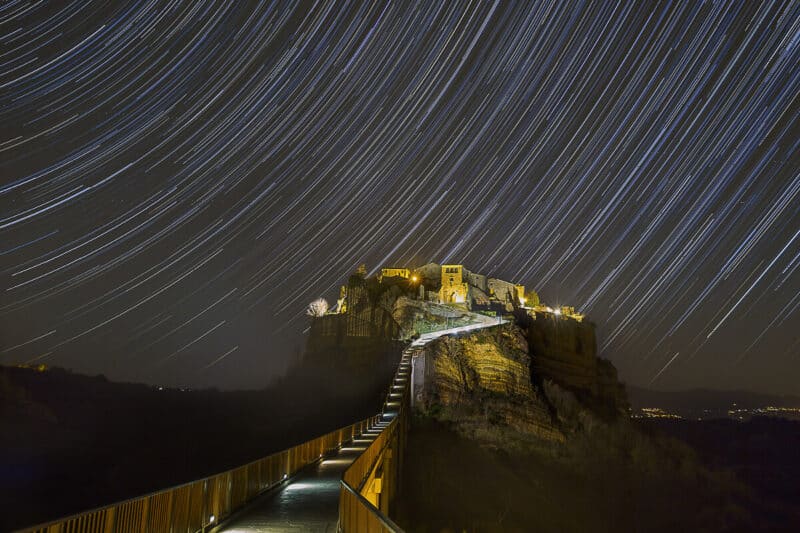
Technical data for the analemma curve:
- Filming start March 2022, filming end March 2023, filming frequency: on average one shot every 15 days, with minimum intervals of 7 days and maximum of 20 days. Based on cloud conditions.
- Shooting times: 07:20 -11:10-15:00 UTC
- Shooting camera: Nikon Z9 set to ISO 32
- Nikon S14-24/2.8 lens closed to f/22
- Shutter Speed: 1/32,000th to 1/8000th depending on sky conditions. 80 photos of the solar disks were taken, but only 68 were used.
- Shooting site: Viterbo Airport (42.22.228N-12.05878E), Italy.
Technical data overview:
- Taken on 1 November 2022, 11:10 UTC
- Nikon Z9 camera set to ISO 32
- Nikon S14-24/2.8 lens closed to f/6.2 with 1/160 times.
- Sum of two 360-degree panoramas of 12 shots each: one on the ground and one on the sky
- Filming location: Arcatelle Aqueduct (Tarquinia, Viterbo, Italy – 42.258649N-11.815915)
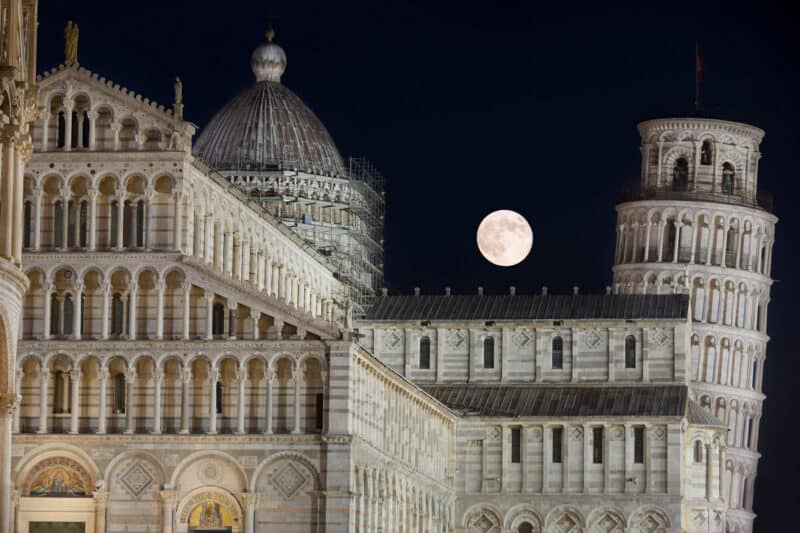
What Equipment Do You Use?
- Camera: Nikon Z9
- Lens: Nikon 14-24mm f/2.8
I started in 1989 with a Russian monocle, then my father gave me a Newton Vixen 100RS Super Polaris for my 18th birthday.
In 2004 I placed the Vixen alongside a Skywatcher Mc127 maksutov with decent performance.
In 2008, I decided to replace the historic Vixen with a wonderful Takahashi TOA130S and a Televue Genesis on 10Micron GM1000HPS. I use Televue Nagler, Pentax XW and Explore Scientific eyepieces with 100 FOV.
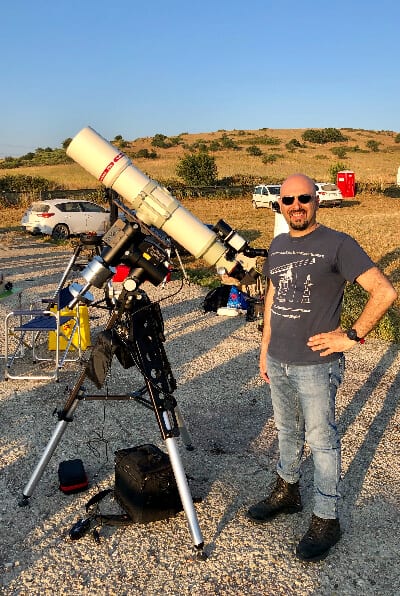
About You – Marco Meniero
Here’s where people can find me:
I’m member of Gruppo Astrofili Galileo (https://www.grag.org/)
I love my job as an air traffic controller, but I also love “controlling”, as a hobby, the sky, stopping its changes and its spectacular nature with a click.
I have a degree in Statistical and Economic Sciences and I am a professional soldier: I worked for six years in the Control Tower of the Galileo Galilei airport in Pisa, two in that of the 4th Fighter Interceptor Wing in Grosseto, eight years in the “Pisa Radar” radar room as “approach controller” and since 2017 I have been working at the “Fabbri” airport in Viterbo.
I have been passionate about astronomy, meteorology and photography since the early 90s and follow my passions with my wife Andreina Ricco. With her in 2003 I wrote the Astronomy notebook “Luci dell’Atmosfera”. My book on optical phenomena was released in 2020: Lucie colori del Cielo, Ronca Editore.
I can count on numerous important awards:
- In 2005 the shot “The Green Flash” was selected among the top 10 best astronomical photos of the year by Astronomy Now.
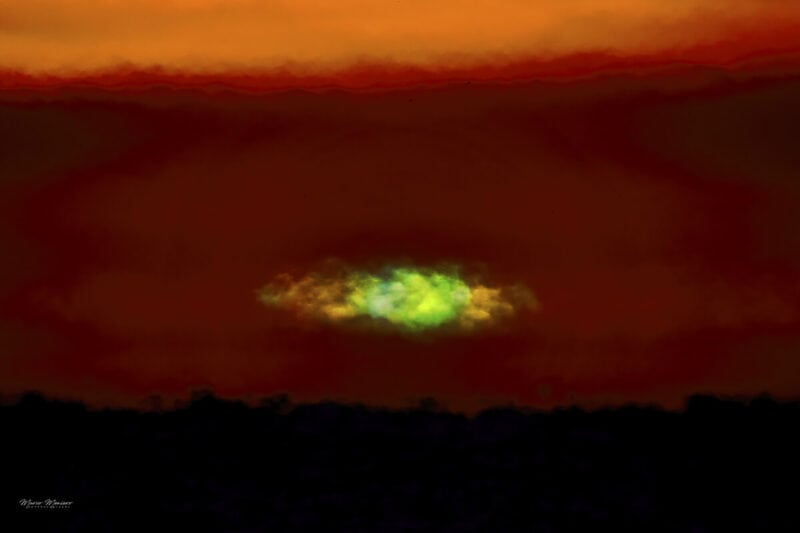
- In 2007 I provided images for the drafting of the Dizionario d’astronomia Ed. Gremese Larousse.
- In 2008 I was entrusted with the creation of the astronomical calendar on behalf of the Nuovo Orione magazine.
- In October 2009, for the International Year of Astronomy, I participated in the Galilean celebrations by speaking at a conference at the Scuola Normale Superiore in Pisa.
- I exhibited in 2010 at Saint Mary’s College in Maryland, USA and in 2011 at the National Science Foundation in Arlington, Washington DC.
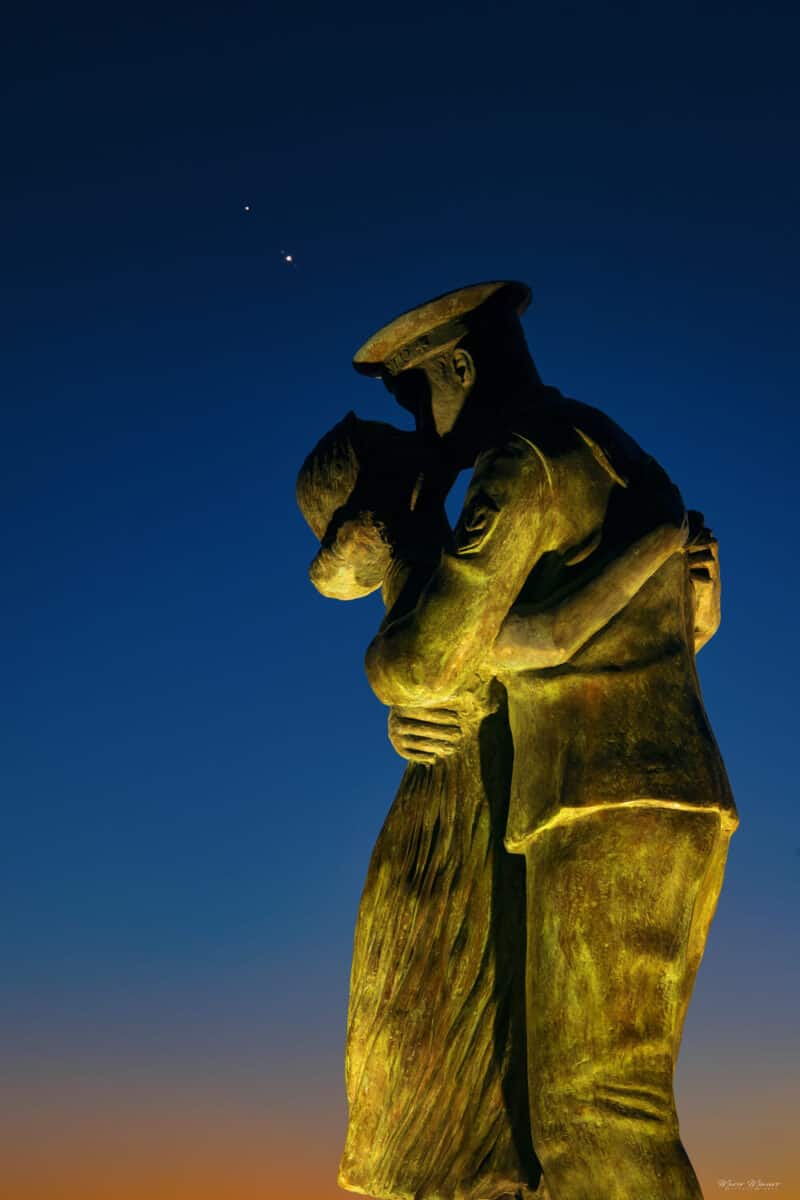
- In December 2013 I held a photography seminar at the Division of Space Technology university campus of Luleä University of Technology in Sweden; I also collaborated in the creation of the book “Kaleidoscope Sky” (Abrams Book).
- In 2017 and 2018 I exhibited in Beijing and Shanghai.
- From 2004 to today I have organized fifteen national photographic exhibitions and events, including the Star Party of Silence 2013 with the collaboration of the European Astrosky Network which saw the participation of Andrea Bocelli and Paolo Nespoli.
- I was a finalist in 2017 and 2018 at the SIPA Contest and winner of the 2013 Italian Astronomical Photography Award, whose jury was made up of representatives of ASI, INAF and ESA.
- I have over 340 photographic publications, numerous covers and 40 writings in sector magazines, 2 Astronomy Picture of Day (NASA) and 45 Earth Science Picture of Day (University Space Research Association).
